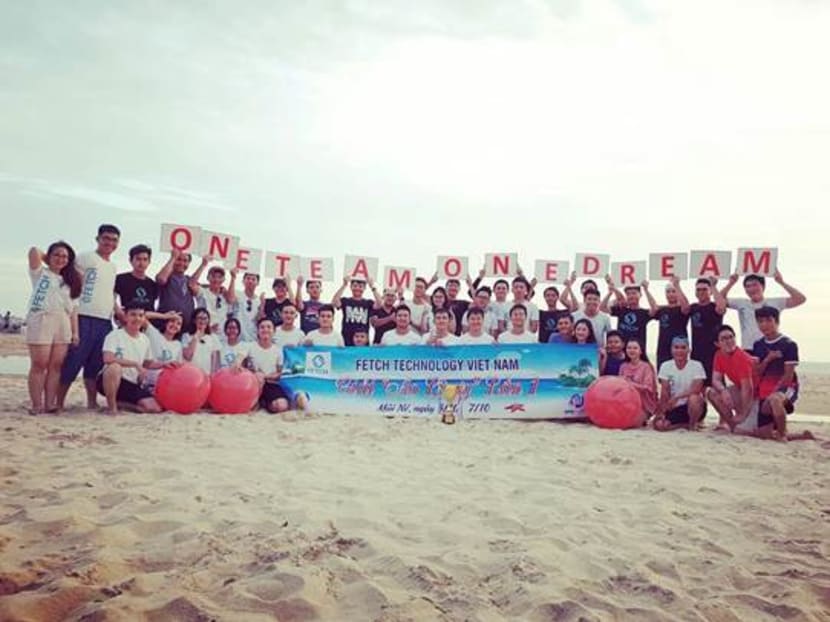Singapore app, Vietnam-based coder: Companies look abroad for tech manpower needs
SINGAPORE — Faced with an uphill task finding tech developers in Singapore, food and beverage start-up Eatsy turned to Vietnam last November. With the help of Singapore offshoring firm Fetch, Eatsy did not need to navigate Vietnamese laws before gaining access to a team of six developers in Ho Chi Minh City.

Singapore offshoring company Fetch has an office in Vietnam, where it provides tech manpower for companies that require them.
SINGAPORE — Faced with an uphill task finding tech developers in Singapore, food and beverage start-up Eatsy turned to Vietnam last November.
With the help of Singapore offshoring firm Fetch, Eatsy did not need to navigate Vietnamese laws before gaining access to a team of six developers in Ho Chi Minh City.
The developers are employees of Fetch and seconded to work exclusively for its clients like Eatsy, a mobile ordering and payment app that allows diners to order, pay and split the bill when dining out.
For S$3,500 a month, Fetch’s clients are able to hire an experienced developer in Vietnam.
In Singapore, that sum is the going rate for a fresh graduate.
The limited number of coders and developers here means “the really good ones will be expensive as every technology company in Singapore will be fighting for the same small pool of resources”, said Eatsy chief executive Shaun Heng.
As Singapore’s pipeline of tech and cybersecurity experts plays catch-up to growing demand, more companies – especially small and medium enterprises – are turning to offshoring firms.
The manpower crunch has grown worse, said Mr Keith Tan, co-founder of Wonderlabs, another offshoring firm that operates in Indonesia and Vietnam.
“Three years ago, for every viable, competent talent, we would have two employers vying for that talent. Today, that number is seven,” he said.
Salaries commanded by the tech workers have gone up, and experienced developers in Indonesia and Vietnam can earn as much as S$6,700 a month, said Mr Tan.
Wonderlabs started in 2015 and services 32 companies currently. Previous clients include IBM, Singtel and the National University of Singapore. Eighty per cent of its employees, who number more than 350, are developers.
Fetch currently has close to 20 corporate clients and hires 120 coders in its two offices in Hanoi and Ho Chi Minh City.
Singapore companies make up 80 per cent of both firms’ clientele.
WHY PICK OFFSHORING OVER FREELANCERS?
Clients pay a service fee to the offshoring firms. In return, they do not have to deal with the uncertainties or risk of intellectual property theft that may come with the hiring of freelancers, who may do their work in a cafe or co-working space.
The offshoring firms provide equipment and office space for their coders and developers.
Clients get candidates proficient in English and who have been trained to the standards that international and Singapore firms require.
Fetch, for instance, has partnered with five universities in Vietnam including the Ho Chi Minh City University of Technology.
The company trains fresh graduates for four to six months, said its chief executive Adrian Lim, who co-founded the venture in 2015 with Mr Chia Luck Yong.
Wonderlabs does not usually hire fresh graduates. But if it does, they undergo an eight-month training programme to hone the skills that are in demand, such as two-factor authentication and React (a library of the JavaScript programming language).
It offers free accommodation for staff when they are in Singapore for familiarisation programmes, while Fetch flies its developers to clients’ headquarters to build rapport for two weeks.
TIME WASTED MAINTAINING LEGACY SYSTEMS
The hunt for tech talent is a challenge worldwide, with good technical positions currently staying open for more than three months on average, said Mr Phoram Mehta, payment services provider PayPal’s head of information security (Asia Pacific).
Efforts in Singapore to address the shortage include the TechSkills Accelerator, a SkillsFuture initiative driven by the Infocomm Media Development Authority in partnership with other agencies and the industry.
As of September, more than 50,000 training places have been taken up or committed in programmes under the TechSkills Accelerator.
But another issue here is that businesses are not using their developers effectively, said Ms Piruze Sabuncu, payment technology platform Stripe’s head of Southeast Asia and Hong Kong.
“Not only are developers scarce, developer time is also being wasted on technical debt and maintaining legacy systems – compounding the strain on developer resources,” she said.
A research report by Stripe this year found that 72 per cent of Singapore businesses are looking to hire developers in the next year, but 69 per cent of the total find it challenging to do so.
Employers should invest in software infrastructure tools to make their companies more flexible and responsive, which would also increase the productivity of developers, Ms Sabuncu suggested.






